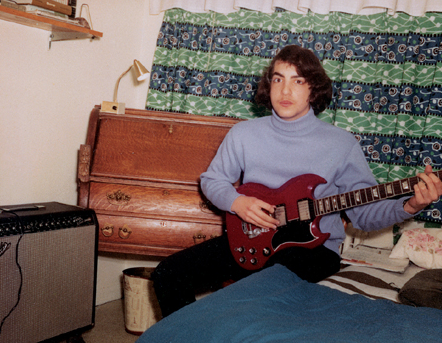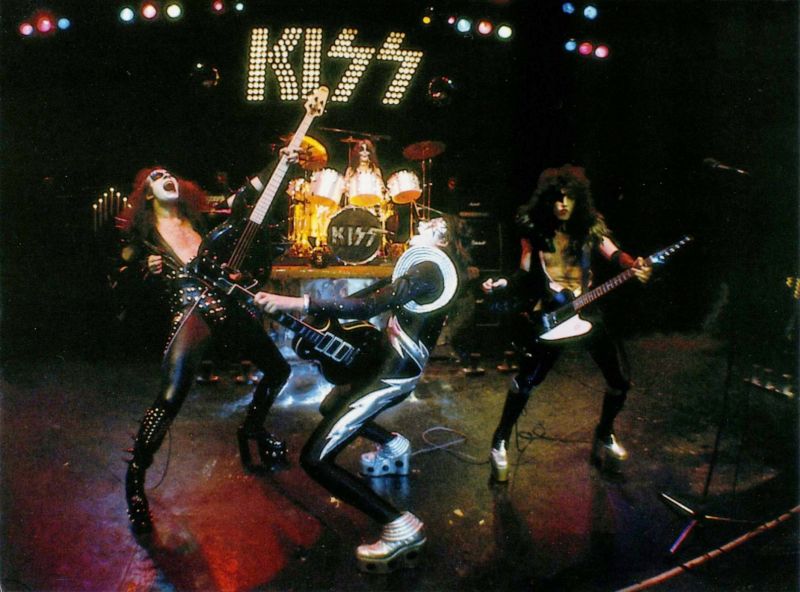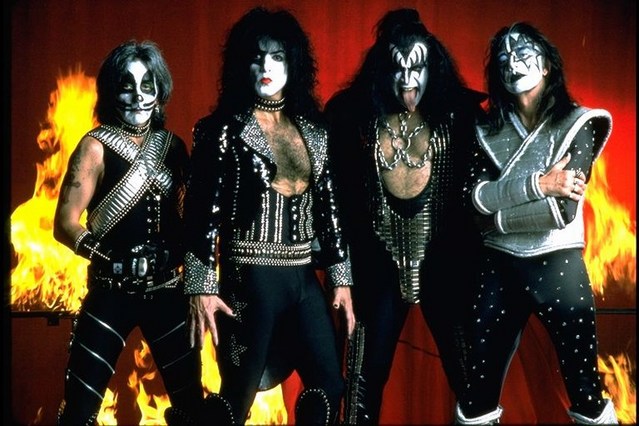For those of you conditioned to the narrative of Vh1’s “Behind the Music” series, you know the stories follow roughly the same arc: struggling musician hits big with a song or album. Money flows. Sex is freely available. Drugs are rampant. Ripped off by a manager or an accountant. Record sales decline. Downward spiral into a chemically dependent depression. Learns from mistakes. Tries to make a comeback.
Paul Stanley is one of the few artists who has avoided some of the trappings of most rock stars. He never got hooked on drugs, rarely drank alcohol (no cold gin for this Starchild), was able to avoid being ripped off by his manager, and dealt with his depression before he started a career in music. His vice, he freely admits (and it’s no secret) in Face the Music: A Life Exposed, was sex with women. I mean a LOT of sex with a lot of women. He and band mate Gene Simmons both had the same vice, but it never led to a financial downfall of paternity lawsuits or a plethora of children claiming Stanley as their father. If anything, Stanley’s memoir paints a picture of a man who was extremely focused and determined to succeed as a rock musician. While many people dream of being a rock star, Stanley and Simmons were very strategic in their quest for fame and fortune. Their first band, Wicked Lester, was a hodgepodge of musical styles, and once the band recorded their one and only album, both Simmons and Stanley agreed that they hated what they heard. They were more enamored with Led Zeppelin, the Rolling Stones, and the Kinks than the other styles Wicked Lester explored, so they retooled their sound to mirror the music they admired. They were able to get out of their Wicked Lester contract, hired Ace Frehley and Peter Criss to round out the new band, and found the sound they were looking for with this new line up. The result was the start of one of the most bombastic, theatrical, and hard-working bands of the 1970s, KISS.
KISS’ shtick of painting their faces, wearing platform shoes and S&M leather, and having smoky explosions on stage was designed to build upon what the New York Dolls and Alice Cooper did on stage — but KISS was going to do it bigger and louder. If it wasn’t for a meeting with Bill Aucoin, who became their manager and “fifth member of the band,” KISS’ chances of superstardom would have been minuscule. Aucoin understood what Stanley and Simmons were trying to do, but was able to build on it by telling them upfront that he wasn’t interested in managing them unless they wanted to be superstars. Aucoin was the one who told the band to appear with their makeup at gigs and other public events. He also bankrolled their early tours by charging expenses to his credit card, and introduced them to financial planners who would take care of their money. Aucoin knew there was something novel about KISS, and the combination of solid rock songs, an effects-heavy show, and the allure of four guys in kabuki-like makeup would likely be a big hit with people who loved hard rock. The formula worked, and the result was a band that skyrocketed to the top with albums and shows that gave audiences a great value for their dollar — until the band started to implode toward the end of the 1970s.
 Stanley and co-writer, Tim Mohr, tell a compelling story that contrasts Stanley Eisen — the son of Jewish immigrants who was born with a birth defect called microtia — with his alter ego, Paul Stanley. Eisen’s condition left him “with nothing more than a stump” on the right side of his head where his ear should have been when he was born. He was also deaf in that malformed ear. Having that crumpled stump opened him up to ridicule from classmates and neighborhood kids who called him “Stanley the One-Eared Monster.” Eisen’s parents and older sister were an odd bunch, too. His parents never really encouraged him in his interests, were rarely affectionate, and told him to fight his own battles when teased by kids. The only “gift” his parents gave him was music. They were fans of symphonic music, and Eisen was enthralled by Beethoven and, of course, rock music at the time.
Stanley and co-writer, Tim Mohr, tell a compelling story that contrasts Stanley Eisen — the son of Jewish immigrants who was born with a birth defect called microtia — with his alter ego, Paul Stanley. Eisen’s condition left him “with nothing more than a stump” on the right side of his head where his ear should have been when he was born. He was also deaf in that malformed ear. Having that crumpled stump opened him up to ridicule from classmates and neighborhood kids who called him “Stanley the One-Eared Monster.” Eisen’s parents and older sister were an odd bunch, too. His parents never really encouraged him in his interests, were rarely affectionate, and told him to fight his own battles when teased by kids. The only “gift” his parents gave him was music. They were fans of symphonic music, and Eisen was enthralled by Beethoven and, of course, rock music at the time.
Eisen’s sister, Julia, suffered from some kind of manic behavior that manifested itself in violent outbursts. One time, when his parents were away, Julia chased him around the house with a hammer, and when 12-year-old Stanley locked himself in his room to protect himself from his sister, she took the hammer and started busting up the door to get in. When his parents returned home, they were angry with him about setting his sister off (he also got a slap from his folks for good measure).
Eisen’s childhood was clearly an important turning point for him. His dysfunctional home life provided him the needed push to get away and start a career that took him from being “Stanley the One-Eared Monster” to being Paul Stanley of KISS. His childhood also framed his personality as a loner who was often emotionally distant from people and had few (if any) friends.
The “loner rock star” trope is one that recurs throughout the book. Stanley’s inner reaction to events in the band’s history portray him as a patient person when strange behavior is occurring around him. Ace Frehley’s laziness and drug and alcohol dependence is chronicled, as is Peter Criss’ volatile moments. Criss in particular is singled out by Stanley in the book as a semi-talented drummer who, when all was said and done, was an idiot when it came to understanding the world and for wasting his talent on drugs.
Even Stanley’s “brother,” Gene Simmons, doesn’t escape criticism. Gene was (and is) every bit as obsessed with being a huge success as Stanley, but Simmons is also an egomaniac whose involvement with the band waned in the ’80s when he wanted to focus on a movie career. If it wasn’t for Stanley’s leadership during that time, KISS would have faded away from the rock scene with a whimper. Moreover, Stanley dispels the notion that Simmons is some kind of marketing genius. All the merchandising of KISS product was never Gene’s idea. It was their manager, Bill Aucoin, who saw the opportunity for an additional revenue stream early in the band’s career and pushed all sorts of KISS related product on the public (who eagerly bought it).
The majority of the book is about the four original members of the band and their rise and fall from fame –well, for a few years, anyway. The retooling of KISS from their ’70s roots into a hair band like Motley Crue, Poison, Whitesnake, and the like was Paul’s brainchild — and it worked. After dumping Criss and Ace quitting the band, the fans did come back to KISS after their late ’70s/early ’80s mistakes (Kiss Meets the Phantom of the Park, the solo albums, Dynasty, Unmasked, and Music from ‘The Elder’), but not in the numbers like their salad days. By the mid-’90s, it seemed the band was at a crossroads: embrace grunge, or put the makeup back on and reform with Ace and Criss. They chose the latter, and made millions of dollars. But whatever success they had as an nostalgia act, they paid for in increased use of drugs and alcohol by Criss and Frehley.
Stanley doesn’t sugarcoat Ace and Peter’s abilities before the reunion tour. Both had lost whatever musical abilities they had after leaving the band — and they had to be taught how to play KISS’ classic songs from future band member (and Ace Frehley replacement), Tommy Thayer. The process was long and difficult, but Ace and Peter were able to re-learn the songs and play at a level that would work for the reunion tour. However, with success came the old drug habits of Ace and Peter. It became unbearable to Stanley and Simmons, but they pushed on with a second tour that was even worse than the first. It was so bad that Stanley and Simmons ended up replacing both Criss and Frehley with Eric Singer and Tommy Thayer during the tour, and surprisingly the audience didn’t seem to care. That’s when Stanley realized that KISS was bigger than its members, and the band could conceivably go on ad infinitum with new members taking over the iconic characters they created. That’s a view that’s untested, but Stanley seems to think that the KISS brand has that kind of longevity.
Overall, Face the Music is quite compelling. Stanley’s boot-strapping, family first (with more than a dash of unbridled sex) philosophy of life is one that may make ideologues from the American Enterprise Institute happy — until they realize that Stanley’s empire was built on songs that celebrated a kind of “if it feels good, do it” attitude of the counter-culture and the sexual revolution. But it’s nearly impossible to ignore that his grit, determination, luck, and talent were key ingredients to his (and the band’s) success. One need just view the KISSology videos to see how hard KISS worked to entertain its fans show after show, tour after tour.
But as the old saying goes, you can’t make an omelet without breaking some eggs, and Stanley has certainly gotten a reputation of breaking more than a few eggs. Throughout the book, he reminds his readers that he’s a loner and people misunderstand him. However, he also takes credit for taking the reins of the band and steering them back to a successful career. It’s because of his songwriting, because of his producing skills, and because of his dedication to quality, did the KISS brand thrive — according to Stanley.
However, you don’t fire original bandmates twice, keep new members (i.e., Eric Carr) in a state of insecurity, another one at your beck and call (i.e. Tommy Thayer), and push your “brother” (i.e., Gene Simmons) to get his shit together and stop contributing lousy songs without becoming a dictator of sorts. This all circles back to Stanley Eisen’s loveless upbringing. It seems Paul Stanley is keenly aware that he does not want the sins of his father and mother to be visited on his own children. However, that kind of tough shell his parents told him to grow, clearly spilled over to his professional side. If Stanley could have talked with Ace, Peter, and Gene about some of the episodes he recounts in his book (in order to get their perspectives), he would have made greater strides in reconciling his emotional difficulties with his desire to be loved and appreciated by his bandmates. Despite the strengths of Stanley’s memoir (and there are many), there’s a recurring effort to gloss over “Paul Stanley the Egocentric Monster” that has dogged him since KISS’ incarnation.









Comments